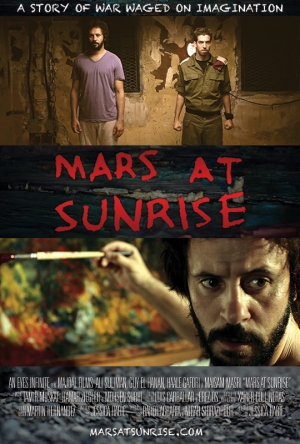“The oppression of war, the power of art and the intersection of Israel and Palestine is depicted creatively.”
“A conflict destroys art. The Israeli Palestinian conflict destroys the body and soul and creative mind. The conflict nurtures hatred and resentment and insanity. I felt more than ever that we need peace so mankind can flourish.”
“Choppy, confusing, self conscious depiction of a very important subject. Could not get the point.”
“Interesting, but confusing – poetic? Well several short stories that butt against each other, but why?
“Sorry we didn’t have the interview with the director before the film was shown. She was the most articulate and eloquent speaker ever! It was a totally amazing interview. She explained many of the ambiguities of the abstract nature of the film. She brought the film to life in an extraordinary way!”
“This movie shows state sponsored violence. Why not a movie about families involved with reconciliation?”
“Provocative and interesting film which allows the viewer the inside processes of the artist by his torturer who is also tortured by his confrontation with an artist. A very brave film! I loved Khalid from the moment I saw him in the classroom, his empathy with a young boy going through his own hell. Exchanging art - brilliant! The discussion of his art through the surrealist images - the TV, Khalid talking about his point of view, etc.”
“Too confusing. Would have been better as a documentary. Too many fragments that didn’t come together.”
“This is why I gravitate towards math and science rather then art or literature.”
The artistic – whatever that means – companion to the great documentary THE GATEKEEPERS. Ms. Habie is taking on the role of cinematic spokesperson for people of her age that are tired of the violence. Violence breeds violence. Stop the circle. An admirable goal, and perhaps the youth of today – both Israeli and Palestinian - will find a way.”
“Although I can feel for the Palestinians this movie was awful.”
“Ambitious, provocative, beautiful, frightening, at times warm, often chilling. The film is many things, perhaps too many things. I’m all for poetry, and I understand Ms. Habie’s desire to get far away from the documentary format she had worked in. Well she did do that, maybe too much of a slingshot to the other side.”
"Let’s hope films like this help the peace process.”
“Subject matter is difficult to deal with.”
“I think the film was trying to say something but I don’t know what. The post film conversation clarified some of it, but it didn’t work for me.”
“Yuch! Should have stayed in bed and caught some extra sleep. However, she was a very interesting guest.”
“Israel is far from blame in the Middle East mess. Abuse goes both ways.”
“Not my thing. There are better ways to say whatever she was trying to say. I found it boring and pretentious.”
“Great interview!”
“Why? She’s a wonderful and excellent speaker. Makes good points and is quite bold! I liked her.”
“Seen through the eyes of a young person ignoring the beginning and middle of events that could have and should have turned other corners. Israel was taught to hate. I too lived in Jerusalem.”
“As admirable this film’s intentions is and as important the issue of promoting peace, the film did not work for me because it was too ‘one note.’ In the first 15 minutes I thought ‘OK I get it’ and the ‘get it’ was not supported by the next 60 minutes which however aesthetic, was thematically redundant. I found the Skype with the director/writer more informative than her film
“Although the filmmaker believes she is being even-handed - Why do Israelis need checkpoints? Is it not because of violence against Israel? Can I see a prison holding Israeli’s where there is not torture? What are the people in Gaza doing to stop violence? Where is all the money sent for Palestinians that should have been used for people’s betterment?”
“The last line says it all ‘Where is the love?’ Shows how torture, abuse, etc. begets the same. A torturer could become the tortured. Will this conflict ever be resolved and peace comes in that area? I don’t think so in the near future. A lot of NY and other Jews will be very upset by this film. I saw 5 BROKEN CAMERAS, which shows from the Palestinian point of view how the Israeli settlements can be illegal and unfair. I’m glad to hear about the Circle Of Families, a group dedicated to reconciliation.”
“What an extraordinary film! An exemplary telling of life in the barren trenches of the Middle East, and the consequences to civilian and soldiers alike when they are forced to live in an absurdist geo-political structure. Great film. And what a splendid filmmaker! One can only hope that this intelligent and thoughtful young woman is truly the future.”
“I wish that this movie would reflect both sides of the conflict since there is injustice and victims on both sides.”
“If the film is 75 minutes it is 75 minutes too long. So Palestinians are good and Israelis are bad. Thank you.”
“Jessica Habie was absolutely wonderful. I had a broken seat and missed a lot of the translation in the film. Yet she brought the film to life in an extraordinary way.”







